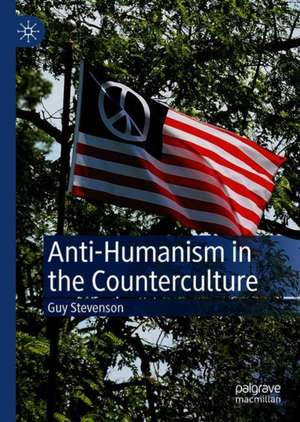Anti-Humanism in the Counterculture
Autor Guy Stevensonen Limba Engleză Hardback – 22 oct 2020
| Toate formatele și edițiile | Preț | Express |
|---|---|---|
| Paperback (1) | 692.88 lei 6-8 săpt. | |
| Springer International Publishing – 23 oct 2021 | 692.88 lei 6-8 săpt. | |
| Hardback (1) | 698.30 lei 6-8 săpt. | |
| Springer International Publishing – 22 oct 2020 | 698.30 lei 6-8 săpt. |
Preț: 698.30 lei
Preț vechi: 821.53 lei
-15% Nou
Puncte Express: 1047
Preț estimativ în valută:
133.62€ • 139.88$ • 110.56£
133.62€ • 139.88$ • 110.56£
Carte tipărită la comandă
Livrare economică 05-19 aprilie
Preluare comenzi: 021 569.72.76
Specificații
ISBN-13: 9783030477592
ISBN-10: 3030477592
Pagini: 213
Ilustrații: VII, 223 p.
Dimensiuni: 148 x 210 mm
Greutate: 0.46 kg
Ediția:1st ed. 2020
Editura: Springer International Publishing
Colecția Palgrave Macmillan
Locul publicării:Cham, Switzerland
ISBN-10: 3030477592
Pagini: 213
Ilustrații: VII, 223 p.
Dimensiuni: 148 x 210 mm
Greutate: 0.46 kg
Ediția:1st ed. 2020
Editura: Springer International Publishing
Colecția Palgrave Macmillan
Locul publicării:Cham, Switzerland
Cuprins
1. Introduction: Romanticism, Humanism and the Counterculture.- 2. Henry Miller and The Beats: An Anti-Humanist Precedent.- 3. Jack Kerouac, Allen Ginsberg and their Transcendentalist Gloom.- 4. William Burroughs’ Immodest Proposal.- 5. The Philosophy of Hip: Norman Mailer’s ‘Spiritual Existentialism’.- 6. Conclusion: Counterculture Then and Now
Recenzii
“Stevenson’s book is a major step toward re-opening the Beats to serious consideration and critical scrutiny—a necessary move … . Anti-humanism in the Counterculture is a bold and original piece of work that deserves to make a significant impact on the way we read the Beats and how we view their legacy in the twenty-first century.” (John Bolin, Journal of Modern Literature, Vol. 46 (2), 2023)
Notă biografică
Guy Stevenson is a lecturer in literature at Goldsmiths and Queen Mary Colleges, University of London, UK and a recent postdoctoral fellow at the Institute of Advanced Studies in the Humanities, the University of Edinburgh, UK. He specialises in modernism and the 1960s counterculture and has published widely on both – including pieces in The European Journal of English Studies and in anthologies about the writers Henry Miller and Ezra Pound. Guy’s essays have appeared in the Los Angeles Review of Books, The Times Literary Supplement and Literary Review, and he is currently editing a special issue of the journal Textual Practice, entitled ‘Anti-Humanist Modernisms’.
Textul de pe ultima copertă
This book offers a radical new reading of the 1950s and 60s American literary counterculture. Associated nostalgically with freedom of expression,
romanticism, humanist ideals and progressive politics, the period was steeped too in opposite ideas – ideas that doubted human perfectibility, spurned the majority for a spiritually elect few, and had their roots in earlier politically reactionary avant-gardes. Through case studies of iconic figures in the counterculture – the sexual revolutionary Henry Miller, Beat Generation writers Jack Kerouac, Allen Ginsberg and William S. Burroughs and self-proclaimed ‘philosopher of hip’, Norman Mailer – Guy Stevenson explores a set of paradoxes at its center. Between a Walt Whitman-like optimism and pessimistic modernist intuitions; between brutal rhetoric and emancipatory desires; and between social egalitarianism and spiritual elitism. Such paradoxes, he argues, are vital to an understanding of the cultural and political worlds these writers helped shape – in their time and beyond.
Caracteristici
The first ever study of anti-humanism in America's 1950s and 60s literary counterculture A major contribution to the study of literary modernist legacies after 1945 Timely context for current debates about identity politics and our culture wars today
